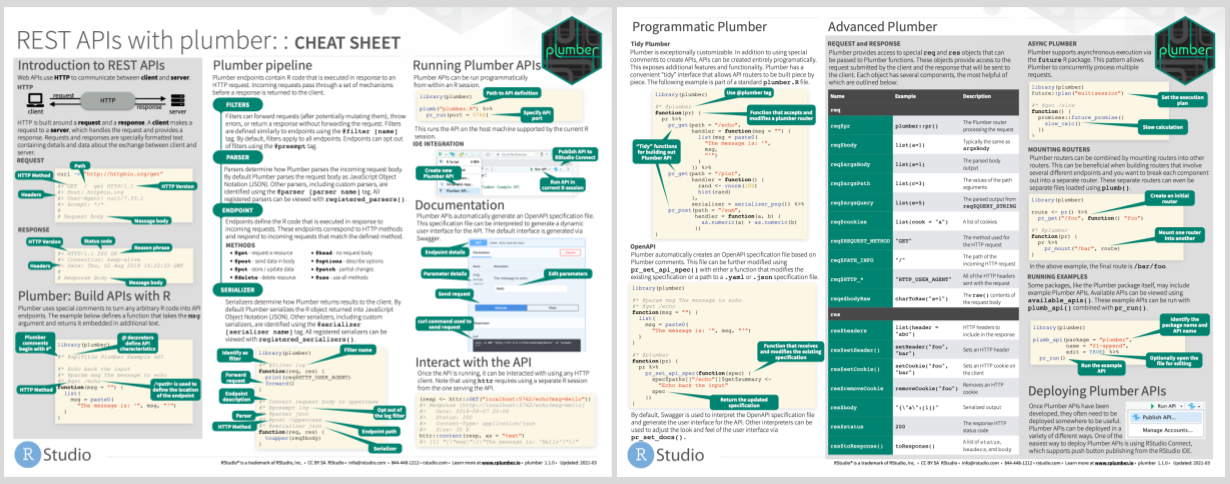https://github.com/rstudio/plumber
Turn your R code into a web API.
https://github.com/rstudio/plumber
api api-server plumber r
Last synced: 10 months ago
JSON representation
Turn your R code into a web API.
- Host: GitHub
- URL: https://github.com/rstudio/plumber
- Owner: rstudio
- License: other
- Created: 2015-06-04T05:09:10.000Z (over 10 years ago)
- Default Branch: main
- Last Pushed: 2025-03-11T18:32:48.000Z (12 months ago)
- Last Synced: 2025-05-03T02:49:17.879Z (10 months ago)
- Topics: api, api-server, plumber, r
- Language: R
- Homepage: https://www.rplumber.io
- Size: 20.5 MB
- Stars: 1,418
- Watchers: 51
- Forks: 263
- Open Issues: 124
-
Metadata Files:
- Readme: README.md
- Changelog: NEWS.md
- Contributing: .github/CONTRIBUTING.md
- License: LICENSE
Awesome Lists containing this project
- jimsghstars - rstudio/plumber - Turn your R code into a web API. (R)
- awesome-shiny-extensions - plumber - Create web APIs by decorating R code with special comments. (Backend / API Frameworks)
README
[](https://github.com/rstudio/plumber/actions)
[](https://www.r-pkg.org/pkg/plumber)
[](https://www.r-pkg.org/pkg/plumber)
[](https://app.codecov.io/gh/rstudio/plumber)
[](https://forum.posit.co/tag/plumber)
Plumber allows you to create a web API by merely decorating your existing R
source code with `roxygen2`-like comments. Take a look at an example.
```r
# plumber.R
#* Echo back the input
#* @param msg The message to echo
#* @get /echo
function(msg="") {
list(msg = paste0("The message is: '", msg, "'"))
}
#* Plot a histogram
#* @serializer png
#* @get /plot
function() {
rand <- rnorm(100)
hist(rand)
}
#* Return the sum of two numbers
#* @param a The first number to add
#* @param b The second number to add
#* @post /sum
function(a, b) {
as.numeric(a) + as.numeric(b)
}
```
These comments allow `plumber` to make your R functions available as API
endpoints. You can use either `#*` as the prefix or `#'`, but we recommend the
former since `#'` will collide with `roxygen2`.
```r
library(plumber)
# 'plumber.R' is the location of the file shown above
pr("plumber.R") %>%
pr_run(port=8000)
```
You can visit this URL using a browser or a terminal to run your R function and
get the results. For instance
`http://localhost:8000/plot` will show you a
histogram, and
`http://localhost:8000/echo?msg=hello`
will echo back the 'hello' message you provided.
Here we're using `curl` via a Mac/Linux terminal.
```
$ curl "http://localhost:8000/echo"
{"msg":["The message is: ''"]}
$ curl "http://localhost:8000/echo?msg=hello"
{"msg":["The message is: 'hello'"]}
```
As you might have guessed, the request's query string parameters are forwarded
to the R function as arguments (as character strings).
```
$ curl --data "a=4&b=3" "http://localhost:8000/sum"
[7]
```
You can also send your data as JSON:
```
$ curl -H "Content-Type: application/json" --data '{"a":4, "b":5}' http://localhost:8000/sum
[9]
```
## Installation
You can install the latest stable version from CRAN using the following command:
```r
install.packages("plumber")
```
If you want to try out the latest development version, you can install it from GitHub.
```r
remotes::install_github("rstudio/plumber")
library(plumber)
```
## Cheat Sheet
## Hosting
If you're just getting started with hosting cloud servers, the
[DigitalOcean](https://www.digitalocean.com) integration included in `plumber`
will be the best way to get started. You'll be able to get a server hosting your
custom API in just two R commands. To deploy to DigitalOcean, check out the
`plumber` companion package [`plumberDeploy`](https://github.com/meztez/plumberDeploy).
[Posit Connect](https://posit.co/products/enterprise/connect/) is a commercial
publishing platform that enables R developers to easily publish a variety of R
content types, including Plumber APIs. Additional documentation is available at
.
A couple of other approaches to hosting plumber are also made available:
- PM2 -
- Docker -
## Related Projects
- [OpenCPU](https://www.opencpu.org/) - A server designed for hosting R APIs
with an eye towards scientific research.
- [jug](http://bart6114.github.io/jug/index.html) - *(development discontinued)*
an R package similar to Plumber but uses a more programmatic approach to
constructing the API.
